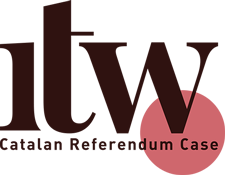Definition
Rebellion
Article 472
A conviction for the offence of rebellion shall be handed down to those who violently and publicly rise up for any of the following purposes:
1. To fully or partially repeal, suspend or amend the Constitution;
5. To declare the independence of any part of the national territory
7. To disaffect from obedience to the Government any armed force.
Article 473
1. Those who, inducing the rebels, have promoted or sustain the rebellion, and its ringleaders, shall be punished with a sentence of imprisonment from fifteen to twenty- five years and absolute barring for the same time; those who act as subaltern commanders, with that of imprisonment from ten to fifteen years and absolute barring from ten to fifteen years, and mere participants, with that of imprisonment from five to ten years and special barring from public employment and office for a term from six to ten years.
2. If weapons have been used, or if there has been combat between the rebellious force and the sectors loyal to the lawful authority, or when the rebellion has caused criminal damage to publicly or privately owned property, cutting off telegraphic and telephone lines, the airwaves, railways or any other kind of communications, with serious violence against persons, demanding contributions or diverting the public funds from their lawful investment, imprisonment shall be handed down, respectively, of twenty- five to thirty years for the former and from fifteen to twenty- five years for the second, and from ten to fifteen years for the latter.
Article 478
Should whoever commits any of the felonies foreseen in this Chapter be an authority, the punishment of barring foreseen in each case shall be substituted by that of absolute barring for a term from fifteen to twenty years, except if that circumstance is specifically included in the criminal classification concerned.
Sedition
Article 544
Conviction for sedition shall befall those who, without being included in the felony of rebellion, public and tumultuously rise up to prevent, by force or outside the legal channels, application of the laws, or any authority, official corporation or public officer from lawful exercise of the duties thereof or implementation of the resolutions thereof, or of administrative or judicial resolutions.
Article 545
1. Those who have induced, sustained or directed the sedition or who appear as the main doers thereof, shall be punished with a sentence of imprisonment from eight to ten years, and with that ten to fifteen years if they are persons with the status of an authority. In both cases, absolute barring for the same term shall also be imposed.
2. Apart from those cases, a punishment from four to eight years imprisonment and of special barring from public employment and office for a term from four to eight years shall be imposed.
Embezzlement
Article 432
1.The authority or public officer who, for profit, steals or allows a third party, with the same intention, to steal public funds or property he has under his charge due to his duties, shall incur a sentence of imprisonment from three to six years and absolute barring for a term from six to ten
2.A sentence of imprisonment shall be imposed from four to eight years and that of absolute barring for a term of ten to twenty years, if the embezzlement is especially serious, in view of the value of the sums embezzled and the damage or hindrance caused to the public The same penalties shall be applied if the items misappropriated are listed due to their heritage or artistic value, or if they are goods assigned to public catastrophe relief.
3.When the amount embezzled does not reach the sum of 4,000 euros, the penalties imposed shall be a fine exceeding two and up to four months, imprisonment from six months to three years and suspension from public employment and office for a term of up to three
Disobedience
Article 410
1.Authorities or civil servants who openly refuse to duly fulfil court resolutions, decisions or orders of a higher authority, handed down within the scope of their respective powers and complying with the legal formalities, shall be punished with a fine from three to twelve months and special barring from public employment and office
Article 73
Authorities or civil servants who openly refuse to duly fulfil court resolutions, decisions or orders of a higher authority, handed down within the scope of their respective powers and complying with the legal formalities, shall be punished with a fine from three to twelve months and special barring from public employment and office
Article 74
1. Notwithstanding what is set forth in the preceding Article, whoever perpetrates multiple actions or omissions, in the execution of a preconceived plan or taking advantage of an identical occasion, that offend one or several subjects and infringe the same criminal provision or provisions that are equal to or of a similar nature, shall be punished as the principal of a continued felony or misdemeanour with the punishment stated for the most serious offence, that shall be imposed in its upper half, it being possible to reach the lower half of the higher degree of punishment.
Criminal organisation
Article 570 bis
1. Whoever promotes, constitutes, organises, co-ordinates or directs a criminal organisation shall be punished with a sentence of imprisonment from four to eight years, if it has the purpose or object of committing serious felonies, and with a sentence of imprisonment from three to six years in other cases; and whoever actively participates in the organisation, forms part thereof or co-operates financially or in any other way therein, shall be punished with imprisonment from two to five years if its purpose is to commit serious felonies, and with a sentence of imprisonment from one to three years in other
For the purposes of this Code, a criminal organisation is construed to be a stable group formed by one or more persons, for an indefinite term, in collusion and co-ordination to distribute diverse tasks or duties in order to commit felonies, as well as to carry out reiterated commission of misdemeanours.
2. The penalties foreseen in the preceding Section shall be imposed in the upper half when the organisation:
a) is formed by a large number of persons;
b) possesses weapons or dangerous instruments;
c) has advanced technological resources for communication or transport that, due to their characteristics, are especially fit to facilitate commission of the offences or the impunity of the
Should two or more of those circumstances concur, the higher degree penalties shall be imposed.



















